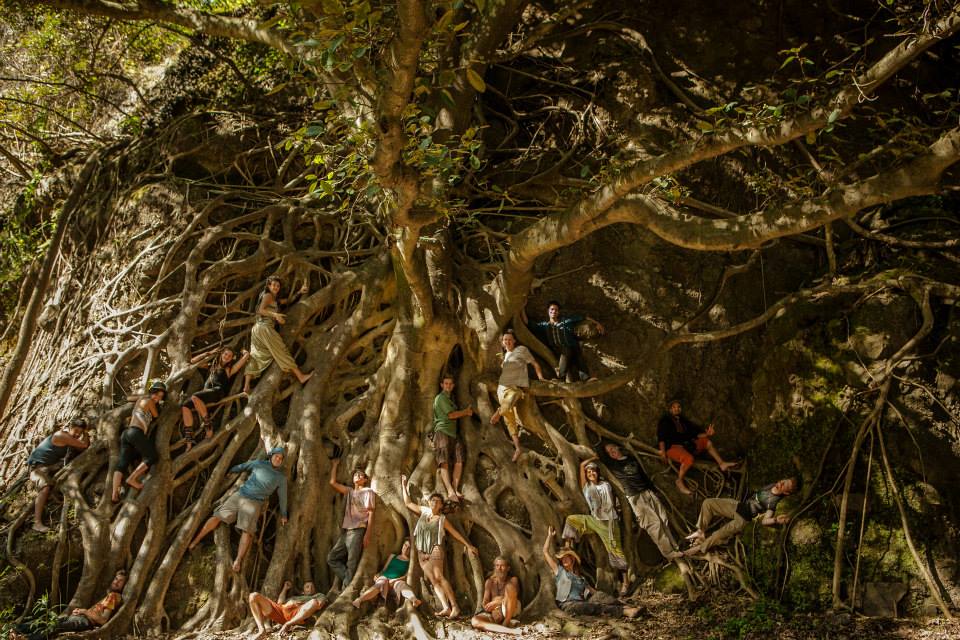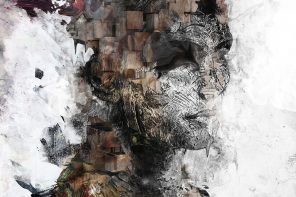What if there were festivals that were held at ecovillages and centers of sustainability? What if you could not only learn how to grow your own food at these festivals, but also walk up to the vendors and eat the food that you planted at the last year’s festival? What if you could learn through hands-on experience how to do natural building, and then see your favorite artists play on the stage you built? What if you could learn new methods of community self-governance and live in that community practicing sustainability year round until the next festival happened there again? Although this may sound like a distant pipe dream, this is happening right now (for one example, see Portugal’s Boom Festival), and there is a community that is looking to plant the seeds for these festivals internationally. This community is Project Nuevo Mundo.
Project Nuevo Mundo (PNM) is a Bay Area based organization with a mission to “build an on-the-ground network and provide imperative, regenerative technology skills and labor and professional media and publicity to festivals, impact centers, and communities in the United States, Mexico, and Central America.” The project’s first step to building this on-the-ground network is to travel across a continent with a team of 21 experts in the realms of permaculture, natural building, and film-making, visiting places and communities that are doing work to literally build a new world. They are calling this pilot trip (the first of many to come) the “Earth Odyssey,” and the selected team members “Econauts.” The trip starts in southern California in early November and will offer their services to designated impact centers and festivals in Mexico, El Salvador, Guatemala, Nicaragua, Costa Rica, and Panama before returning home. You can read more details about the project and how to support the project in the final hours of its Indiegogo campaign here.
Lost in Sound was fortunate enough to catch up with PNM co-founder David Casey, to dig deeper into his vision for not only connecting ecovillages and festivals, but fully integrating them to birth some of the most radically regenerative transformational experiences one can find. In addition to co-founding PNM, David is also one of the lead producers of Cosmic Convergence, a transformational gathering of epic proportions that is making serious leaps and bounds to take music festivals to the next level. In this interview, LiS investigates the future of transformational festivals and their potential to lead the way to a more sustainable world.
[LiS] PNM’s longterm vision is quite large, including a network of people and places all over the world. How do music festivals fit into the grand scheme of Project Nuevo Mundo?
[David] Transformational festivals are containers for the transformational experience to occur. One of the primary mission components of Project Nuevo Mundo is to become a resource, reference point, and source for transformational experiences of all kinds. Festivals have the capacity to create the transformational experience on a mass scale, and this is a great opportunity for us to provide it on a higher level than we would otherwise be able to, and to a broader and more diverse sector of the population than our smaller events reach. We see the festival experience as an opportunity to create an experimental platform for new ideas to be expressed.
Festivals are also key to fueling the growth of the PNM network. We produce our own international festivals such as Cosmic Convergence, which enable more people to learn about the network, while raising funds for local social outreach and permaculture projects supported by PNM. We are also creating many smaller experiences around the Convergence which will enable visitors to Guatemala to dive into more profound transformational experiences through our retreats, workshops, volunteer opportunities, and cultural tours. These kinds of events are also a way of creating financial abundance and sustainability for the locals as well as our organization, which will allow us to continue to grow and attract talent.
It is clear that people within the festival community are realizing more and more that there is massive potential for music festivals to be major agents of change in ushering in the new paradigm. Can you speak to this vast potential of festival gatherings that focus on music and other forms of art?
The format of the gathering is actually from a very old tribal paradigm of which we are incorporating increasing elements throughout our transformational culture. The gathering brings together individuals in a unified intention, which can be to celebrate life, dance as one, or to make a specific prayer. Unified intention has a very strong potential for manifestation. The format of the gathering lets each one of us bring our gift, our creative expression to the community, and allows each one of us to be honored as a creator. The gathering also brings us together under a unified purpose and brings us into dance under unified motion. The trance-dance experience is an ancient practice with the purpose of dissolving the individual ego and strengthening psychological ties to the community through ritual.
This experience has the potential to empower us in our daily lives, and let us realize that we have far more potential within us than we had imagined before as creators and doers.
As I mentioned above, the gathering is an opportunity to create an experimental model under which our community can come together and self-organize in mutual support. We can take these experiences of “the temporary community” and think of creative ways we can apply the same organizational principles to the communities we live in, and therefore dream into being the kinds of communities we would like to live in.
Festivals have the capacity to transform our individual understanding of our role in community and what it means to be an individual living in community, as well as transform our understanding of what the potential is for a new kind of community based on an emerging ethical and value system that emphasizes compassion.
One of the places where festival culture can use some serious improvement is in the realm of resource consumption. Whether it’s all the gas emissions from patrons traveling to festivals, the food and packaging waste on site, or the infrastructure that is thrown away afterwards, festivals produce a lot of waste. How would a PNM style festival address these issues and take gatherings to the next level?
The easy answer to this is to produce gatherings on property that is owned rather than rented. When we own property, we can build a settlement rather than a temporary village. We can build permanent structures, composting toilets, and other infrastructure that a venue needs to sustain large gatherings, as well as grow food on-site. This opens up a whole world of possibility. We can produce “leave-a-trace” gatherings rather than “leave-no-trace” festivals.
PNM is developing a model for a “leave-a-trace” gathering that is not just a festival. It is a multi-level educational experience that trains its attendees with interactive hands-on techniques on how to build up sustainable infrastructure geared towards sustaining human settlements, while simultaneously building the infrastructure during the event. At the same time, it raises money to sustain the builders and provides a transformational festival experience to attendees.
Our first mobile infrastructure installation and education team is currently being deployed on a test run through Latin America, where we will leave small traces at each site visit we make, whether it’s a small ecovillage or large transformational gathering.
There seems to be a collective dream that so many of us are collectively dreaming up in various iterations, and this is the dream of a permanent community that reflects the joyful freedom of the festival lifestyle in daily life and integrates regenerative techniques and systems to make the community sustainable. Let’s face it, anyone who has attended a music festival has experienced the longing for the magical experience to continue when Monday rolls around, and it’s time to go back to the “real world.” Is such a community achievable? What will it take to create a community like this?
I have lived in a couple of these communities before, so I know they exist. I traveled across Latin America for three years looking for the ideal community that integrates the more desirable and sustainable elements of the “festival lifestyle” into the default world. InanItah in Nicaragua is one of my favorites. I spent two years in Guatemala trying to create my dream of community living. It was a great learning experience, more than I learned in years of university! The biggest teaching I received was that I was not yet ready to create this project in its entirety – that I did not possess the knowledge, the support network, or the well-thought out long-term vision to bring the project to its full fruition. It also taught me that I am capable of far more than I ever imagined. Hundreds of volunteers from all around the world flowed through our project during its most active phase, all with the same burning desire to build, learn about, and be immersed in the new culture.
Building a community takes good planning, committed team members, a sustainable social dynamic, and functional communication processes, as well as a clearly defined vision that is shared among community members. The specific skill sets required to build the necessary infrastructure can come afterwards; creating a community is learning by doing.
Our goal is to create a nomadic network of mobile villages on wheels that are trained to equip aspiring community builders with tools that will empower them to build communities, while physically building them up at each site where we hold a gathering. I feel that this is the most efficient way we can spread the culture of the new world.
My transformational experiences have empowered me with the knowledge that we can dream a new world into being by projecting our inner realities outwards, clearly focusing on and holding a vision and maintaining unbending willpower, faith in success, and purity in intention. When we do this in community, our potential becomes magnified.
How can our readers get involved with PNM’s activities? What kind of skills does the project need to grow into its fullest potential?
The main ingredient necessary for the PNM network to grow is passion. We are looking for passionate individuals with a drive to explore, experiment, and build the new world. PNM is hosting fundraiser events in California as well as in Guatemala, and a few other locations in Central America over the winter. Attend an event and become part of the network!
Readers can support the project by sharing our Indiegogo campaign and our project with friends so we can get our pilot launch journey off the ground and into the ecosphere! Every time someone shares an article or a link, it helps us spread through social media, and social media presence is a large part of what will help this network to grow.
We are actively seeking builders, permaculture designers, engineers/architects, software engineers/programmers, user interface/graphic designers, social media/communications specialists, accountants, lawyers, finance professionals, networkers… We are attracting the right people, but we are dreaming big and we need a lot of support to dream this vision into being.
With such an ambitious dream for an extensive network, PNM is partnering up with individuals, organizations, and initiatives all across the continent that have similarly aligned visions and missions to make such a project take off as quickly and successfully as possible. Asheville-based Tribal Council Collective is one such organization seeking to build an interconnected network of centers for sustainable learning, celebration, and living. As the players continue to find each other and unite under the common cause of utilizing the powerful potential of festival life to build a better world for everyone, the momentum and capability of the movement continue to grow at an impressive pace. Another organization blazing trails in this area is Tribal Convergence Network. The movement is happening right now, so visit the following links to see how you can contribute your much needed skills and energy!
Help support this amazing vision by sharing the PNM Indiegogo campaign on Facebook and donating to the campaign.
Visit Project Nuevo Mundo on Facebook to follow the updates from the Earth Odyssey’s 4-month journey through Central America this winter. They will be releasing short videos from every impact center they visit along the way.
Finally, if you are interested in getting involved with PNM’s efforts and possibly being an econaut on a future Earth Odyssey, contact them at ProjectNuevoMundo.org.
David Casey is the founder of Project Nuevo Mundo, a network for planetary regeneration and individual transformation. David holds a degree in Political Economy of Industrial Societies with concentrations in Global Poverty & Practice and the Political Economy of Energy, from University of California – Berkeley. He has spent four years in Central America working on land-based permaculture projects, event production, teaching English, and clothing design.
About the Author: Clayton Gaar is most widely known for his visionary work as the founder and director of Tribal Council Collective, an Asheville-based intentional production collective and an ever-evolving conscious community rooted in the southeast U.S. He is also the Workshop Director for Gratifly Music and Arts Festival. After years of traveling the music festival and transformational gathering circuits, Clayton moved back to Asheville, NC in 2012 to grow his roots in the world of permaculture design and sustainable community building. He recently finished a yearlong permaculture design apprenticeship with Permaculture In Action after receiving his Permaculture Design Certificate in the French Broad watershed. In accordance with his mission to unite his life passions of transformational festival culture and permaculture, Clayton is dreaming up a diverse gene pool of projects that catch and store the energy of festival gatherings in the form of lasting regenerative communities.





